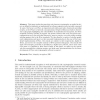Free Online Productivity Tools
i2Speak
i2Symbol
i2OCR
iTex2Img
iWeb2Print
iWeb2Shot
i2Type
iPdf2Split
iPdf2Merge
i2Bopomofo
i2Arabic
i2Style
i2Image
i2PDF
iLatex2Rtf
Sci2ools
126
click to vote
EUROCRYPT
2006
Springer
2006
Springer
Cryptography in Theory and Practice: The Case of Encryption in IPsec
Abstract. This paper studies the gaps that exist between cryptography as studied in theory, as defined in standards, as implemented by software engineers, and as actually consumed by users. Our focus is on IPsec, an important and widely-used suite of protocols providing security at the IP layer of network communications. Despite well-known results in theoretical cryptography highlighting the vulnerabilities of unauthenticated encryption, the IPsec standards currently mandate its support. We present evidence that such "encryption-only" configurations are in fact still often selected by users in practice, even with strong warnings advising against this in the IPsec standards. We then describe a variety of attacks against such configurations and report on their successful implementation in the case of the Linux kernel implementation of IPsec. Our attacks are realistic in their requirements, highly efficient, and recover the complete contents of IPsec-protected datagrams. Our att...
Cryptology | EUROCRYPT 2006 | IPsec Standards | Linux Kernel Implementation | Protocols Providing Security |
Related Content
| Added | 22 Aug 2010 |
| Updated | 22 Aug 2010 |
| Type | Conference |
| Year | 2006 |
| Where | EUROCRYPT |
| Authors | Kenneth G. Paterson, Arnold K. L. Yau |
Comments (0)

